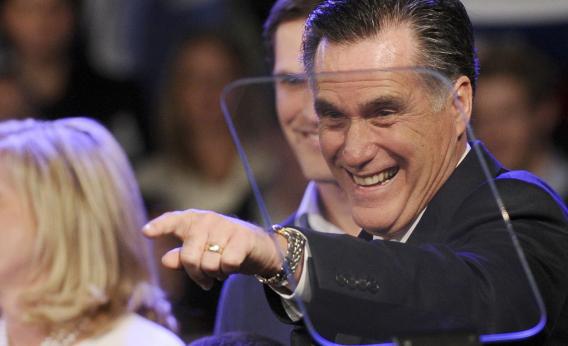This is what jumped out to me, anyway. Make your own analysis! The CNN exit polls from 2012 are here; the 2008 numbers are here.
More people actually like Romney this year… We’re waiting on some final precincts, but thus far Mitt Romney has won 95,669 votes in New Hampshire. That’s 20,000 more votes, and counting, than he won four years ago. After Iowa, my colleague Sasha Issenberg pointed out that Romney’s turnout models were amazingly consistent, with his vote total barely shifting. He improved with every single group.
… but more Republicans are’t voting. In 2008, 61 percent of voters in New Hampshire were self-identified Republicans. In 2012, that number fell to 49 percent as independents surged into the GOP primary, voting narrowly for Ron Paul. So in 2008, roughly 143,260 Republicans turned out for their primary. In 2012, with some ballots out, it was 119,050 – round it up and probably 121,000 or so self-identified Republicans came out. This is tricky math, because every Republican victory everywhere involves a swath of conservative but self-described “independent votes.”
The Romney surge was bigger than the Huntsman surge. Really, it was. Twenty-one percent of voters made up their minds on election day, and Mitt Romney won 32 percent of them. Huntsman won 22 percent of them.
Romney won Catholics – against two Catholic candidates. After Rick Santorum did so well in Iowa, I was among the armchair pundits pointing out that Iowa would be a good habitat for observing Catholic voters. It was. Catholics could have cared less about which candidates shared their faith. Thirty-five percent of voters at the polls were Catholic, and Romney won 45 percent of them. He ran stronger with them than he ran with any other religious group. Santorum got 10 percent; Catholic convert Newt Gingrich got 8 percent. As a Romney adviser suggested to me last night, if this kind of support can hold, the candidate is basically bulletproof.
Come together, Tea Party! In Iowa, 34 percent of Republicans said they “strongly supported” the Tea Party and Romney won only 14 percent of them, runnin fourthg. In New Hampshire, 22 percent of Republicans said this and Romney ran first, but with only 36 percent, lower than his average vote. No news here, but the Movement That Changed the Republican Party can’t make any impact in the presidential race. Still.
The anti-Barack Obama movement in the Democratic Party is weak. Before the primary, frequent Obama critics like Pat Caddell used precious op-ed space to call for a Write-In Hillary Clinton movement. And there was a big write-in vote: 5,378 Democrats scribbled something in there, writing in at roughly seven times the rate of Republican voters. The result was that Barack Obama got only 82 percent of the vote. Horrible, right? Well, not fantastic… but actually a better percentage than George W. Bush pulled in 2004, when he won slightly less than 80 percent of votes in the Republican primary. The anti-Obama protest vote is punier than the one that greeted a president who got re-elected – while losing New Hampshire, though.
